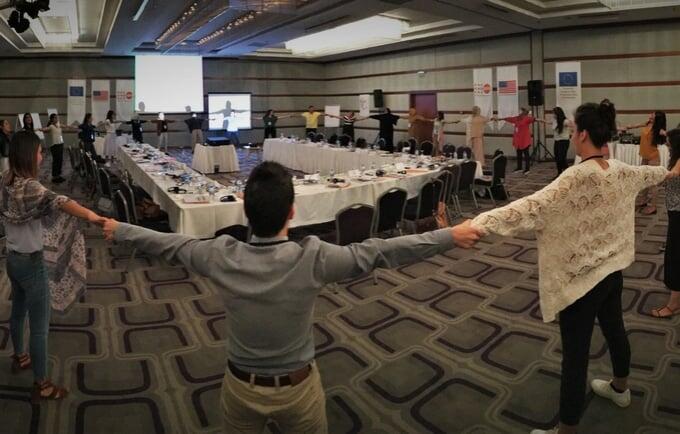United Nations Population Fund (UNFPA) organized training in Ankara titled “Training on the Minimum Initial Service Package (MISP) for Sexual and Reproductive Health in Crises” between September 18-20, 2017 which was funded by European Civil Protection and Humanitarian Aid Operations (ECHO) and the U.S. State Department’s Bureau of Population, Refugees, and Migration. Approximately 30 health professionals - social service providers, midwives, and psychologists - from 11 various provinces in Turkey, the majority of them from UNFPA’s Women and Girls Safe Spaces attended the training. The participants listened to the UNFPA Turkey office’s experts’ presentations on the topics of sexual and reproductive health, sexual violence, gender-based violence, and mothers' and newborns’ health during and after crises.
The main aim of this training is to reduce mothers' and newborns’ mortality rate during and after crises, to reduce & interfere with gender-based violence cases, to lower sexually transmitted diseases and HIV/AIDS cases, and prioritize family planning services to maintain mothers’ and families’ overall health.
One of the presenters from the UNFPA Turkey office was Dr. Behire Özek, a Sexual and Reproductive Health Expert, who educated the participants about the mothers' and newborns’ health during and after crises. About the training, Dr. Özek said that “For our Women and Girls Safe Spaces staff, we highlighted the importance of providing sexual and reproductive services during and after crises for our beneficiaries, which is shaped in line with the requirements of Minimum Initial Service Package (MISP). We organized this training to lower the number of mothers and new-borns’ mortality rate during and after the crises, to facilitate health and to be able to set up fully functional coordination systems among all related sectors during these crises, to decelerate the rate of sexually transmitted diseases and HIV, and finally to prevent & to interfere gender-based violence and create conditions for effective know-how dissemination.”
Another presenter from the UNFPA Turkey office was Dr. Gökhan Yıldırımkaya, Reproductive Health Program Coordinator, who made presentations on family planning and HIV & sexually transmitted diseases. About the training, Dr. Yıldırımkaya noted that “We are glad to hear very valuable feedback from the participants indicating that the participants are improving their practical and applicable health information’s depth and the amount which can come handy when assisting the beneficiaries in the field. Plus, thanks to this training, the Women and Girls Safe Spaces staff can now define their key role more clearly in the work of humanitarian aid area, assisting social integration and facilitating effective communication between government agencies. By means of this newly acquired knowledge, they now equipped themselves with new sets of skills regarding how to take necessary steps for the wellbeing of our beneficiaries.”

United Nations Population Fund (UNFPA) will continue organizing training sessions to answer the unmet demand in the area of humanitarian aid work in Turkey.
United Nations Population Fund (UNFPA) is the lead UN agency for delivering a world where every pregnancy is wanted, every childbirth is safe and every young person's potential is fulfilled. UNFPA expands the possibilities for women and young people to lead healthy and productive lives. UNFPA was established in 1969 and began working with the Government of Turkey in 1971. UNFPA Turkey office’s activities were initially carried out on a project-by-project basis. Today, the UNFPA Turkey office has been working on the issues of sexual and reproductive health, gender-based violence, and gender equality, and runs a humanitarian aid program for the refugee population in Turkey. The first multi-year Country Programme ran from 1988 to 1992. The Sixth Country Programme (2016 to 2020) is currently underway.
To accomplish UNFPA’s ambitious goals, UNFPA specifically focuses on four Sustainable Development Goals (SDG); SDG 3: Good Health and Well-Being; SDG 4: Quality Education, SDG 5: Gender Equality and finally SDG 17: Partnership for the Goals. To learn more about the United Nations Sustainable Development Goals, please click here.


